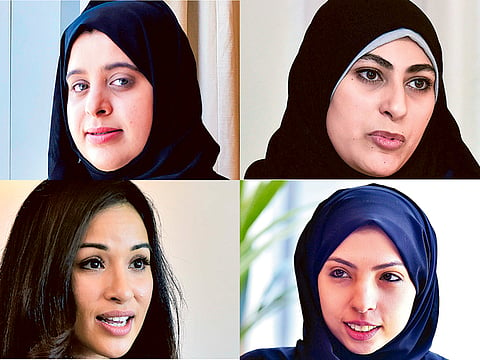Emirati scientist wins Women in Science award
Hanifa Al Beloushi recognised for her novel work in biodiesel production

Dubai: Emirati scientist Hanifa Al Beloushi is this year’s UAE recipient of the L’Oréal-Unesco for Women in Science Middle East Fellowship award, for her research in designing a novel system for enzymatic biodiesel production.
Al Beloushi, who is assistant professor at the Chemical and Environmental Engineering Department at Masdar Institute, was among three other women from the Middle East to receive the fellowship at an awards ceremony at Zayed University in Dubai on Tuesday night.
All the four winners received an endowment of 20,000 euros each (around Dh80,829) in support of their work.
At the event, Minister of State for Tolerance Shaikha Lubna Al Qasimi, who is also president of Zayed University and the patron of the event, congratulated the winners.
Shaikha Lubna said: “I commend the work being done by the L’Oréal Foundation and Unesco through the For Women In Science Programme, which raises the level of scientific research in the region and encourages Arab women scientists to pursue their dreams, work for the progress of humanity and make a difference in the world. It is my honour to offer my patronage to a programme that wholeheartedly motivates female scientists from the GCC and recognises their excellent contribution to fields where women are underrepresented.”
Al Beloushi said she was honoured to win the recognition, adding she would be involving Masdar students in her work.
Speaking about her research, she told Gulf News the project involves developing environment-friendly bio catalysts, rather than chemicals ones, in biodiesel production. She is also developing new compounds to keep the bio enzymes active in the process, to increase the yield, as well as integrating the extraction of oil and its conversion into biodiesel as one continuous process rather than separate steps.
Biodiesel is an alternative to regular diesel that is produced from vegetable oil (among other substances). It can and is used as fuel in regular vehicle engines. Much of the raw material for biodiesel in the UAE and elsewhere comes from waste oil in restaurants. Al Beloushi is also working on alternative sources such as microalgae.
She said the research has tremendous potential to save resources and the environment, increase production, and save costs.
Al Beloushi said despite the UAE’s standing as an oil-rich country, “we have to look for alternatives, plan now for the future and see what’s suitable for the UAE”.
She added that she hopes her work will yield results that will convince companies to adopt her process. “I cannot convince them unless I have some statistics and values and unless it is cost-effective,” Al Beloushi said.
The other three winners, who are all assistant professors at universities are Dr Maha Al Asmakh from Qatar University; Shimaa Hassan Eisa from the College of Science and General Studies in Riyadh; and Lila Habib from Kuwait University.
Nearly 2,250 women in over 110 countries have been recipients of the Fellowship over the past 18 years. With Unesco, the Foundation has honoured almost 100 award laureates for their research achievements — two of whom have gone on to win a Nobel Prize.
Thierry Houssin, managing director, L’Oréal Middle East, said the fellowship “continues to build on our firm commitment to women everywhere. As a group, we believe in gender diversity in order to make science of greater relevance to all. We work actively to make women be heard. As women make up one half of humanity, their voices must find expression if scientific research is to continue to solve our most pressing problems”.
The 2016 L’Oréal-Unesco for Women in Science Middle East Fellows:
Hanifa Taher Al Beloushi, (UAE), assistant professor at the Chemical and Environmental Engineering Department at Masdar Institute: For her research in designing a new novel system for enzymatic biodiesel production.
Dr Maha Al Asmakh, (Qatar), assistant professor, Biomedical Science at the Health Sciences College in Qatar University: For her research on microbiota and its effects on brain development and reproductive health.
Shimaa Hassan Eisa, (Saudi Arabia), assistant professor of research at the Chemistry Department, College of Science and General Studies, Riyadh: For her research in the development of novel DNA Aptamer-based Biosensing technology for the detection of glycated haemoglobin in human whole blood.
Lila Habib, (Kuwait) assistant professor at the Biomedical Engineering Unit, Department of Physiology, Faculty of Medicine, Kuwait University: For her research in developing muscular dystrophy patient-specific induced pluripotent stem cell-based assays (evaluation) for disease modelling.



